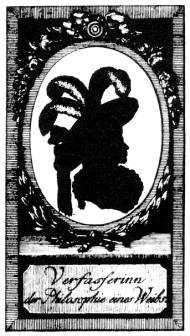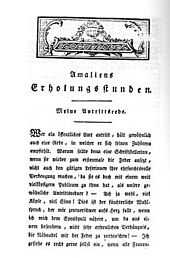Marianne Ehrmann
| Marianne Ehrmann | |
|---|---|
 „Verfasserin der ,Philosophie eines Weibs'“, paper cutting by an unknown artist | |
| Born |
25 November 1755 Rapperswil |
| Died |
14 August 1795 (aged 39) Stuttgart |
| Other names | Marianne Ehrmann-Brentano; Madame Sternheim; Maria Anna Antonia Sternheim |
| Occupation | journalist, novelist and publicist |
| Years active | 1780–1795 |
Marianne Ehrmann (née: Marianne Brentano-Corti, also Marianne Ehrmann-Brentano and Madame Sternheim, born 25 November 1755; † 14 August 1795) was one of the first women novelists, publicists and journalists in the German-speaking countries.
Life and career
Early life
Born in Rapperswil in the canton of St. Gallen in Switzerland, Marianne was the daughter of Sebastiana Antonia Corti (Curti) and the merchant Franz Xaver Brentano. She had nine siblings; her mother died on 22 April 1770. Around 1772/73 Franz Xaver Brentano moved with his children to Wurzach in southern Germany. In 1775 died also her father, and a little later died her only surviving sister. Marianne Brentano moved to her uncle Dominic von Brentano,[1][2] who was a priest and chaplain at the Imperial Abbey of Kempten. He supported the young woman in the following years, when Marianne Brentano worked as a governess in aristocratic houses.[1]
Learning years
Around 1777 Marianne Brentano married an officer of unknown name, but she got divorced in 1779, after he gambled away the money and was violent, and she may have had a miscarriage caused by the ill-treatment of her husband. He indebted, stole money and fled to escape the punishment. Marianne was financially, physically and psychologically ruined after two years of marriage, fell into insanity and was guarded for months. With the help of her uncle, she recovered. About three years later, she went to Vienna, where she unsuccessfully worked as a governess, and then joined a troupe of actors. Under the name Madame Sternheim she stayed a number of years on the stage. With various theater companies, Marianne Brentano toured Austria, Germany, Switzerland, Holland, and even Hungary and Transylvania.[1]
Her first books "Müssige Stunden eines Frauenzimmers" (literally: Moderate hours of a dame) and "Von einer Beobachterin" (from an observer) in 1784, and later "Philosophie" were published anonymously; the latter caused quite a stir. During a stay of the troupe in Strasbourg, Marianne Ehrmann met the junior postdoctoral lawyer Theophil Friedrich Ehrmann. Due to the resistance of his parents, they had to marry in secret in 1785, though her seven years younger husband lived with his parents and they met only in the evening until 1786, when the reconciliation with Ehrmanns parents occurred. Marianne Ehrmann published under the pseudonym Maria Anna Antonia Sternheim the spectacle "Leichtsinn und gutes Herz oder die Folgen der Erziehung", meaning literally levity and good heart or the effects of education. The Duke Charles of Württemberg and his wife Franziska provided Theophil Friedrich Ehrmann as professor in the Charles School, but they moved to Stuttgart in 1788, but the duke broke his word given. So Marianne Ehrmann became the co-editor on the journal "Der Beobachter" (observer), that was published by her husband.[1]
Journalist, publisher and writer
Marianne Ehrmann became one of the first women novelists and publicists in the German speaking countries.[3][4] Around 1780, Marianne Ehrmann had published as Madame Sternheim the play "Leichtsinn und gutes Herz oder die Folgen der Erziehung". Beginning in 1787, she wrote for the Frauen-Zeitung newspaper which was also published by her husband, and the epistolary novel "Amalie and Minna". She also worked on the weekly Der Beobachter, published by her husband since August 1788. Her first literary success was in 1784 the novel "Philosophie eines Weibs" (literally: philosophy of a wife),[5] in 1788 followed by the autobiographical epistolary novel "Amalie: Eine wahre Geschichte in Briefen" (literally: Amalie: a true story in letters). From 1790 to 1792 she issued the monthly published women's magazines Amaliens Erholungsstunden (literally: Amalie's holiday hours).[4] Because the self-publishing could not handle the success of the magazine, Marianne and her husband agreed a year before on a takeover by the publisher Johann Friedrich Cotta, but in 1793 occurred irreconcilable conflicts with Cotta; Cotta founded the journal Flora with the subscriber base, and Marianne Ehrmann continued the magazine Einsiedlerinn aus den Alpen (literally: The women hermit in the Alps), whose contributions also mostly were written by herself.[3] Die Einsiedlerinn aus den Alpen, published by Orell Füssli in Zürich, was the first magazine that was edited in Switzerland by a women; her early death stopped the further issues.
On 14 August 1795 Marianne Ehrmann Brentano died in Stuttgart at the age of 39 years of pneumonia.[1] Marianne Ehrmann's posthumous writings Amaliens Feierstunden (literally: Amalie's celebration hours) were published in 1796, and she was regarded by contemporary people as a philosopher of the Age of Enlightenment.
Work (excerpt)

- 1780: Leichtsinn und gutes Herz oder die Folgen der Erziehung. Ein Original-Schauspiel in fünf Aufzügen.[6] (play, written as Madame Sternheim)
- 1784: Philosophie eines Weibs: Von einer Beobachterin. Im Jahr 1784.[5] (novel)
- 1787: Amalie and Minna (novel)
- 1788: Amalie: Eine wahre Geschichte in Briefen (novel)
- 1790–1792: Amaliens Erholungsstunden (monthly women's magazine)
- 1793–1794: Die Einsiedlerinn aus den Alpen (women's magazine)
- 1796: Amaliens Feierstunden (posthumous work)
- Ein Weib ein Wort. Kleine Fragmente für Denkerinnen. Published by Maya Widmer and Doris Stump. Kore, Freiburg (i. Brsg.) 1994, ISBN 3-926023-51-1.
- Amalie. Eine wahre Geschichte in Briefen. Published by Maya Widmer and Doris Stump, in: Schweizer Texte, Volume 6. Chronos Verlag, Zürich 1995, ISBN 3-0340-0820-1.
- Die Einsiedlerinn aus den Alpen. Published by Annette Zunzer, in: Schweizer Texte, Volume 15. Chronos Verlag, Zürich 2001, ISBN 3-0340-0827-9.
- Nina's Briefe an ihren Geliebten. Zenodot, 2007, ISBN 978-3-86640-129-7.
Literature
- Mary Helen Dupree: The Mask and the Quill. Actress-Writers in Germany from Enlightenment to Romanticism. Bucknell University Press, Bucknell PA 2011, ISBN 9781611480245.
- Annette Zunzer: Marianne Ehrmann - Die Einsiedlerinn aus den Alpen. Paul Haupt Verlag, Bern 2002, ISBN 9783258063447.
- Anne Fleig: Handlungs-Spiel-Räume: Dramen von Autorinnen im Theater des ausgehenden 18. Jahrhunderts. Königshausen und Neumann, Würzburg 1999, ISBN 3-8260-1525-8.
- H. S. Madland: Marianne Ehrmann: Reason and Emotion in her Life and Works. Women in German Literature (Volumen 1). Peter Lang, New York 1998, ISBN 978-0820439297.
- Alois Stadler: Die Familie Brentano und die Stadt Rapperswil. In: Seepresse Bezirk See und Gaster, Rapperswil 1996.[7]
- Gottfried August Bürger, Theophil Friedrich Ehrmann: Briefe an Marianne Ehrmann: Ein merkwürdiger Beitrag zur Geschichte der letzten Lebensjahre des Dichters. Industrie-Comptoir, 1802.[8]
References
- ↑ 1.0 1.1 1.2 1.3 1.4 "Ehrmann, Marianne" (in German). zeno.org. Retrieved 2014-12-17.
- ↑ Alois Stadler (2002-12-18). "Brentano, Dominik" (in German). HDS. Retrieved 2014-11-28.
- ↑ 3.0 3.1 Maya Widmer (2005-11-08). "Ehrmann, Marianne" (in German). HDS. Retrieved 2014-11-28.
- ↑ 4.0 4.1 "Das Stammbuch Friedrich von Matthissons: Transkription und Kommentar zum Faksimile: Nr. 49 Marianne Ehrmann, geb. Brentano" (in German). Wallstein Verlag, Google books. 2007.
- ↑ 5.0 5.1 "Philosophie eines Weibs". Sophie: A Digital Library of Works by German-Speaking Women. Retrieved 2014-11-28.
- ↑ "BLKÖ:Sternheim, Madame" (in German). Wikisource: Biographisches Lexikon des Kaiserthums Oesterreich. 2013-08-11. Retrieved 2014-11-28.
- ↑ Helga Neumann (1999-01-01). Zwischen Emanzipation und Anpassung: Protagonistinnen des deutschen Zeitschriftenwesens im ausgehenden 18. Jahrhundert (1779-1795) (in German). Königshausen & Neumann, Google books. Retrieved 2014-11-28.
- ↑ Gottfried August Bürger, Theophil Friedrich Ehrmann (1802). Briefe an Marianne Ehrmann: Ein merkwürdiger Beitrag zur Geschichte der letzten Lebensjahre des Dichters (in German). Industrie-Comptoir, Google books. Retrieved 2014-11-28.
External links
| Wikimedia Commons has media related to Marianne Ehrmann. |
- Maya Widmer: Ehrmann, Marianne in German, French and Italian in the online Historical Dictionary of Switzerland, 8 November 2005.
| Wikisource has original text related to this article: |
- Publications by and about Marianne Ehrmann in the catalogue Helveticat of the Swiss National Library